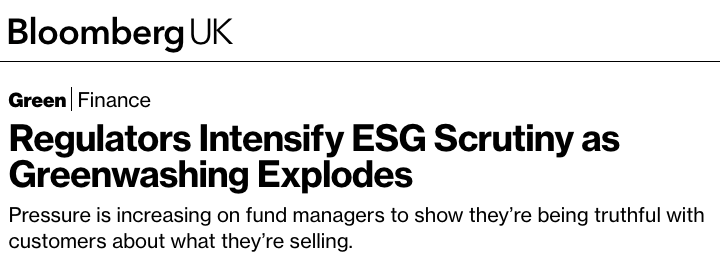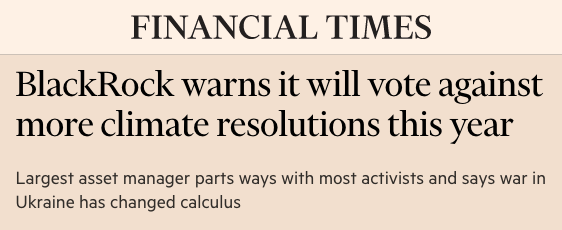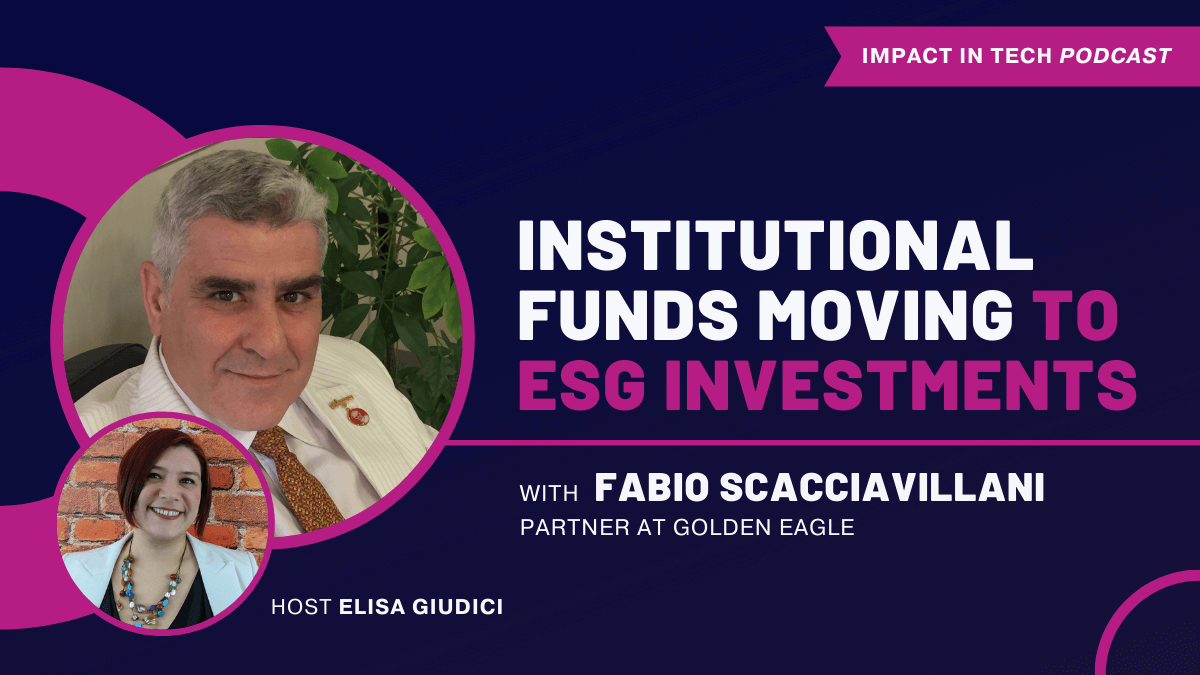Why Control Anxiety Is Skyrocketing Among ESG Investors
ESG investment is broken
Hello Impact Nation,
The same morning that Russia invaded Ukraine, the Church of England’s $5 billion pension fund decided to clear its portfolio of Russian investments. At that point, there were still buyers.
ESG funds had to follow the same strategy under less favourable conditions.
Let’s stress one word: “had”.
ESG funds *had* to clear their Russian portfolio. Because of how ESG works, they didn’t have a choice.
Today, we are going to talk about why this happened, and why it started a domino effect of billion-dollar losses and increased control anxiety among ESG investors.
We will all be hit by the consequences for a long time.
Embrace yourself for the ride!
This Week We Are Diving Into:
1. Why Control Anxiety Is Skyrocketing Among ESG Investors
2. Good Gossip
3. News & Opportunities
4. Coming Soon: Interview with Fabio Scacciavillani
Elisa
The Impact Lady
Why Control Anxiety Is Skyrocketing Among ESG Investors
As the losses and economic fallout mount, asset managers are increasingly calling the (Russia-Ukraine) war a clarifying moment for ESG in the industry.”
– Bloomberg
ESG funds were hit by the Russia-Ukraine war more than their traditional counterparts.
It should have been the opposite.
Russia is a major exporter of oil and gas. Therefore, sanctions on Russia should boost the use of solar and alternative energies.
And ESG funds are all about investing in environmentally friendly energies. Right?
Well, not really.
In truth, ESG compliance is like a scorecard.
Did you increase the number of diverse employees? ✔️ Check ➔ Assign points
Do you operate under proper governance? ✔️ Check ➔ Assign points
And so on. You get the idea!
ESGs are not directly related to the real impact of your investment.
In fact, for many institutional investors, a green energy business might *not* be suitable for ESG investments. If your core business is the environment itself, it’s hard to take action to become ‘greener’. If you are not becoming greener, you are not getting ESG points. Thus, you are a bad (ESG) investment.
It’s no surprise that financial regulators from all around the world are beginning to question the use of ESG-labeled investment products.
Why ESG funds lost more from the Russian invasion
Remember the ESG scoreboard card?
Do you operate under proper governance? ✔️ Check ➔ Assign points
The moment Russia went under sanctions, doing business in Russia was not ESG compliant anymore.
ESG funds didn’t have the luxury to schedule the clearing of their Russian portfolio.
They HAD to leave the country immediately or violate their investors’ agreement.
Traditional funds investing in ESG funds had to do the same.
The result has been billions of dollars of losses for multiple ESG investments.
Even worse, the investors realized that an ESG fund can lose everything if the investment ceases to be ESG compliant (even if it’s still making an impact.)
An investment can lose its status as ESG compliant for external events (for example, Russia going under sanctions)
Or for internal decisions (for example, greenwashing. The manager investing in something that looks ESG compliant, but it’s not)
This is not just an issue for ESG funds.
Institutional funds, including sovereign funds, are moving more resources into ESG investing.
This trend might be reduced by the events listed in this newsletter (the invasion of Ukraine from Russia, and the many investigations for greenwashing.)
Control anxiety as a collateral effect
Institutional funds might rethink the size of their ESG investments.
But there is also a collateral effect: Control Anxiety.
Even when they decide to invest, they might ask for bigger control – More members of the board, more shares, sometimes majority shares.
In fact, if ESG compliance works like a scorecard, the only way to reduce risks is to control the scorecard.
More freedom for the founder tends to bring better results. We learn that from successful tech startups. However, ESG compliance does *not* measure the results.
More influence on the goals might bring a better impact. However, ESG compliance does *not* measure the impact.
The only way to be ESG compliant is to ignore the return on investment and ignore the good impact produced by the investment.
You just need to focus on the scorecard.
We bet that many funds will not oblige.
Blackrock seems to prove that we won the bet.
Good Gossip
Congrats to …
Tinna Nielsen and Angela Jhanji ↪ have been appointed Equitable Transformation Lead for Social and Human Sustainability and Managing Director for Sustainability Integration at EQT Group, a global investment organization.
Deborah Ng ↪ has been appointed Head of ESG & Sustainability at GMO (Grantham, Mayo, & van Otterloo), a global asset management firm.
Mike Faillo ↪ has been appointed Chief Sustainability Officer at Fifth Third, a financial service company.
Cydar Medical ↪ raised £7M to revolutionize minimally invasive image-guided surgery to improve patient outcomes and cost-effectiveness. Investors included: Pembroke Capital and GWC
Carbon Clean ↪ raised $150M to scale heavy industry decarbonization solutions. Lead investor: Chevron. Investors included: CEMEX Ventures, Marubeni Corporation, WAVE Equity Partners, AXA Investment Managers, Samsung Ventures, Saudi Aramco Energy Ventures, and TC Energy.
Arcadia ↪ raised $200M to finance the expansion of the company’s energy data platforms. Lead investor: J.P. Morgan Asset Management.
Process Vision ↪ raised £1.5M to develop specialist pipeline monitoring solutions to detect contamination in the oil and gas industry. Investors include Henley Business Angels.
News & Opportunities
BlackRock warns that it will vote against more climate resolutions this year. The world’s largest money manager, with nearly $10 trillion assets under management, said that Russia’s invasion of Ukraine had changed the scenario, requiring more short-term investment in traditional fuel production to boost energy security.
Ontario Teachers’ Pension Plan to invest $1 billion in a new offshore wind company. The $185 billion pension fund will invest in 14 wind farms in South Korea, Taiwan, Japan, Ireland, and Britain, developed by Macquarie’s newly launched offshore wind developer, Corio Generation.
The Netherlands will become the first government to align green bonds with the new EU's sustainable investment rulebook. The European Union itself plans to raise up to 250 billion euros in green bonds.
IBM Study: CEOs say sustainability is imperative but data might show their inability to take action. While 95% of CEOs report implementing a sustainability strategy, only 23% seem to implement such a strategy across their entire organization.
The UN-backed Initiative Climat International (iCI) has launched a new standard for greenhouse gas emissions disclosure. The initiative aims to bring private equity more in line with quoted companies.
Novelis to invest $2.5 billion to build low-carbon aluminium recycling and rolling plant. The new plant will be based in Bay Minette, Alabama, USA, and it will have an initial 600 kilotonnes capacity per year.
Phillips 66 to spend $850 million on converting the San Francisco Refinery in Rodeo, California, into a renewable fuels facility. The project is supposed to reduce carbon emissions by the equivalent of taking 1.4 million cars off California roads each year.
🚀 COMING SOON
Institutional Funds Moving to ESG Investments - With Fabio Scacciavillani, Partner at Golden Eagle
Video interview available from Thursday - Stay tuned
It should not be necessary to add any disclaimer but … Let’s say it anyway! This is not financial or tax advice. This newsletter is strictly educational and is not investment advice or a solicitation to buy or sell any assets or to make any financial decisions. DYOR - Do Your Own Research!




